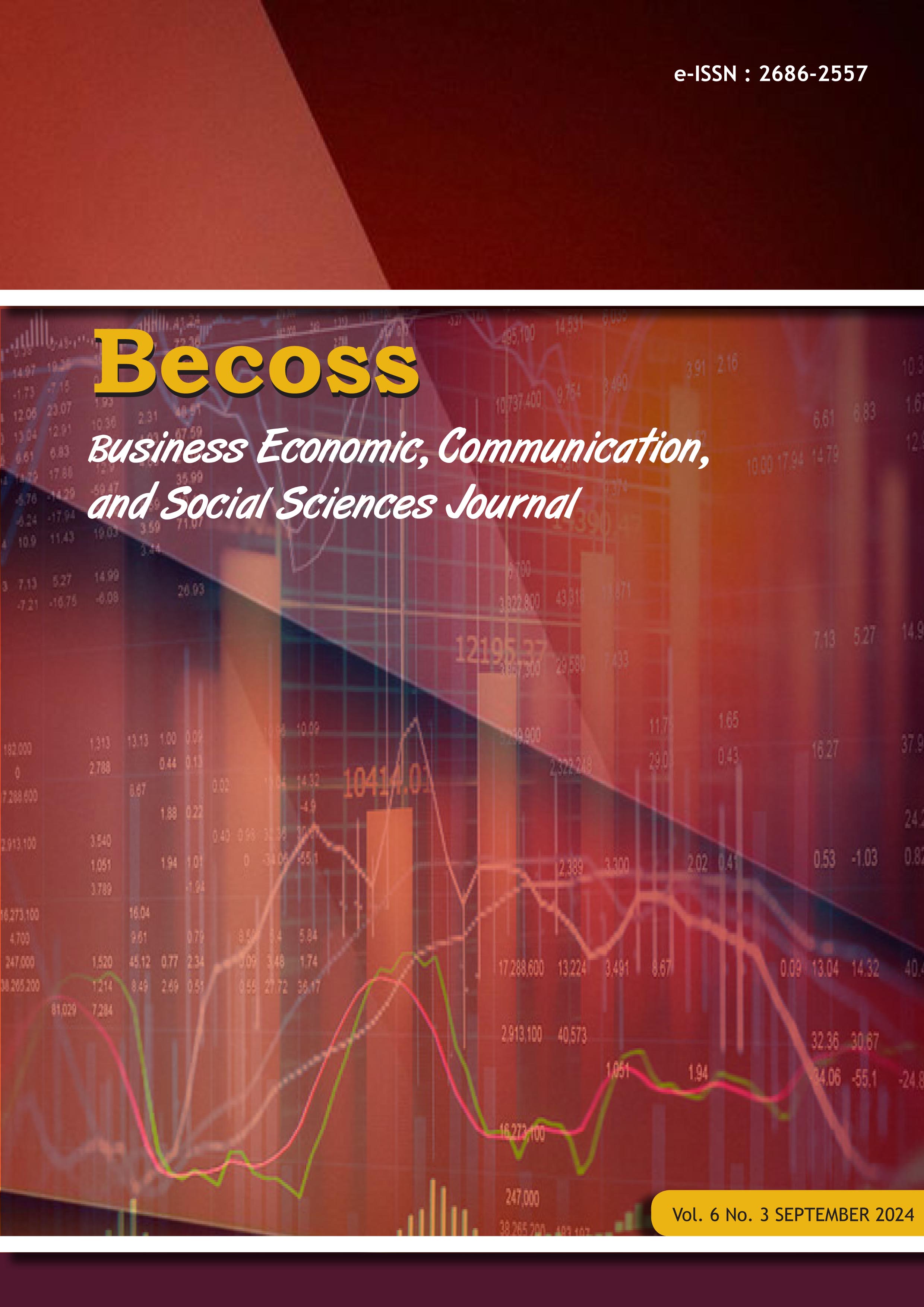Strategic Use Cases of Digital Transformation Implementation in Cities in Developing Countries
DOI:
https://doi.org/10.21512/becossjournal.v6i3.12084Keywords:
Smart City, Digital Transformation, Internet of ThingsAbstract
Global competition for business process efficiencies and investment, rapidly growing and aging populations, rising concerns about climate change, economic inequality, digital gap, and keeping pace with technological innovation are just a few of the challenges cities around the world face in meeting citizens’ expectations for personalized, mobile government services. To address these complex systemic challenges, cities must design smart city initiatives as part of digital transformation implementation to connect disparate operations and siloed processes, starting with smaller, focused projects at the department level and progressing, step by step, toward an integrated city ecosystem. The purpose of this research is to provide insights into some strategic use cases for implementing digital transformation in cities in developing countries as a reference for prioritization so that local governments in developing countries can manage the complexities of smart city implementation through the empowerment of internet of things (IoT) technology. This research focused on some smart city use cases found in developing countries, i.e. Pune (India), Da Nang (Vietnam), and Mexico City (Mexico).
References
United Nations. (2022). World Population to Reach 8 Billion on 15 November 2022. Retrieved August 26th 2024 from https://www.un.org/en/desa/world-population-reach-8-billion-15-november-2022
Universitas Gajah Mada. (2023). UGM Professor Calls for Sustainable Water Management to Address Urbanization Challenges. Retrieved August 26th 2024 from https://ugm.ac.id/en/news/ugm-professor-calls-for-sustainable-water-management-to-address-urbanization-challenges/
Chui, M. (2021). The Internet of Things: Catching up to an Accelerating Opportunity. McKinsey & Company. 16-41.
Eng, Gavin (2023). Smart Cities: State of the Market. Omdia. 4-37.
Juniper Research (2021). Smart Traffic Management to Significantly Reduce Congestion and Emissions. Retrieved August 23rd 2024 from https://www.juniperresearch.com/press/smart-traffic-management-to-significantly-reduce/
Juniper Research (2023). Smart Traffic Management to Generate Revenue of $18.5 Billion Globally by 2028; Accelerated by Smart Cities’ Investment. Retrieved August 24th 2024 from https://www.juniperresearch.com/press/smart-traffic-management-to-generate-revenue/
Qian, Y.; Wu, D.; Bao, W.; Lorenz, P. The internet of things for smart cities: Technologies and applications. IEEE Netw. 2019, 33, 4–5
Verrest, H., & Pfeffer, K. (2019). Elaborating the Urbanism in Smart Urbanism: Distilling Relevant Dimensions for a Comprehensive Analysis of Smart City Approaches. Information, communication and society, 22(9), 1328-1342. https://doi.org/10.1080/1369118X.2018.1424921
James, Peggy; Astoria, Ross; Castor, Theresa; Hudspeth, Christopher; Olstinske, Denise; Ward, John (2020). "Smart Cities: Fundamental Concepts". Handbook of Smart Cities. Springer International Publishing. pp. 1–26. doi:10.1007/978-3-030-15145-4_2-1
Goldsmith, Stephen (2021). As the Chorus of Dumb City Advocates Increases, How Do We Define the Truly Smart City?. datasmart.ash.harvard.edu. Retrieved 27 August 2022.
Tratz-Ryan, Betina (2024). Hype Cycle for Smart City Technologies and Solutions. Gartner, Inc. 5-6. G00812918
Darabkh, K.A.; Alfawares, M.G.; Althunibat, S (2019). MDRMA: Multi-data rate mobility-aware AODV-based protocol for flying ad-hoc networks. Veh. Commun. 18, 100163.
Mirzagayeva, Shamiya; Aslanov, Heydar (2022-12-15). The Digitalization Process: What Has It Led to, and What Can We Expect in the Future?" (PDF). Metaphysics. 5(4): 10–21. eISSN 2617-751X. ISSN 2616-6879. OCLC 1117709579. Archived from the original (PDF) on 2022-11-12. Retrieved 10-14-2022.
Gillis, Alexander (2021). What is the Internet of Things (IoT)?. IOT Agenda. Retrieved 17 August 2021.
Rehak, A. et al., (2019). IoT Enterprise Insight Survey 2019/2020 – Asia-Pacific. Informa PLC.4-41.
Canali, J., et al., (2022). IoT Enterprise Survey: Summary Report – 2022. Informa PLC. 3-42.
Downloads
Published
How to Cite
Issue
Section
License
Copyright (c) 2024 Business Economic, Communication, and Social Sciences Journal (BECOSS)

This work is licensed under a Creative Commons Attribution-ShareAlike 4.0 International License.
Authors who publish with this journal agree to the following terms:
- Authors retain copyright and grant the journal right of first publication with the work simultaneously licensed under a Creative Commons Attribution License - Share Alike that allows others to share the work with an acknowledgment of the work's authorship and initial publication in this journal.
- Authors are able to enter into separate, additional contractual arrangements for the non-exclusive distribution of the journal's published version of the work (e.g., post it to an institutional repository or publish it in a book), with an acknowledgment of its initial publication in this journal.
- Authors are permitted and encouraged to post their work online (e.g., in institutional repositories or on their website) prior to and during the submission process, as it can lead to productive exchanges, as well as earlier and greater citation of published work.
USER RIGHTS
All articles published Open Access will be immediately and permanently free for everyone to read and download. We are continuously working with our author communities to select the best choice of license options, currently being defined for this journal as follows: Creative Commons Attribution-Share Alike (CC BY-SA)






